In 2018, Hazza Al Mansouri and Sultan Al Neyadi, were selected from a pool of over 4,000 applicants for the inaugural batch of the UAE astronaut programme. The achievements of both have now put them in history books. Maj Al Mansouri achieved the historic distinction of becoming the UAE's first astronaut, embarking on an 8-day mission to the International Space Station (ISS) in September-October 2019, travelling to space aboard the Russian Soyuz spacecraft. Dr Al Neyadi, who underwent training alongside Maj Al Mansouri in Russia, served as the backup astronaut for the mission. His opportunity to journey into space materialised later, as part of Nasa's SpaceX Crew-6 flight during Expedition 69, thanks to an agreement between the Mohammed Bin Rashid Space Centre and Axiom Space.
Sultan Al Neyadi, a pioneer and a symbol of the nation's ambition, underwent extensive training at Nasa’s Johnson Space Centre and embarked on a six-month mission to lay the groundwork for more ambitious future missions to the Moon, Mars and beyond. As the first long-duration Arab astronaut mission, this achievement holds great promise for the future of space exploration and our understanding of the human body's response to the rigours of space travel. He travelled aboard the Space X’s Crew Dragon spacecraft on March 2, spent 184 days aboard the ISS and landed safely on September 4, spending a total of 186 days in space. He also became the first Arab astronaut to conduct a spacewalk or EVA (Extra Vehicular Activity).
Not only did Dr Al Neyadi conduct a series of groundbreaking scientific experiments that promise to improve our understanding of a number of scientific phenomena, but being in space for such a long duration made him a research subject himself. The challenges of prolonged space travel, including muscle atrophy, bone density loss and body fluid displacement, became a real-life laboratory for understanding the body's resilience and adaptability. Studying these impacts on his body and how it recovers after returning to Earth will help us better prepare astronauts for future expeditions to the Moon, Mars and beyond.
One of the most fascinating experiments that Dr Al Neyadi conducted involved the study of the human heart. Microgravity, a technical term used to describe the lack of gravity in space, accelerates the weakening of heart muscles, providing an ideal environment to study the aging process. Artificial heart tissues were developed by Johns Hopkins University and Stanford, and were put to test by Dr Al Neyadi. The findings could revolutionise our understanding of cardiac health and aging, potentially leading to groundbreaking treatments on Earth.
Another noteworthy experiment involved protein crystallisation. The ISS offers an ideal environment for growing crystals, which can then be used to develop medicines that are easily administered to patients on Earth. Dr Al Neyadi's contribution to this field promises to advance drug development and improve healthcare worldwide.
However, perhaps the most inspiring aspect of this mission was the Genes in Space experiment, proposed by a high school student, Pristine Onuoha. This experiment focused on telomeres – protective caps found at the end of our chromosomes (thread-like structures that are important for the functioning of cells – and protecting our cells from damage. In space, the length of telomeres increased, suggesting a potential key to slowing down the aging process and preventing severe diseases. The implications for improving human health, especially as we age, are immense.
Dr Al Neyadi's outreach efforts, including "a call from space", which were widely attended events in the UAE and broadcast online, captured the world's imagination and highlighted the UAE's commitment to inspire the next generation of scientists and engineers.
This mission is not just about one astronaut's journey; it symbolises the UAE's continued investment in the space sector and scientific research. The nation's rapid progress, including the successful Hope mission and upcoming asteroid belt mission, has firmly established it as a pioneer in the Arab world and serves as a model for other countries in the region to follow. The rich history of astronomy in the Arab world is experiencing a revival, positioning the region as an important player in the global space sector.
Moreover, the UAE's commitment to cutting-edge research lays the foundation for a Stem-based economy, growing the local private space sector and promising sustained long-term economic growth. With agencies planning to establish permanent human bases on the Moon and Mars, the UAE's ambitious goals align with the broader vision of space exploration and the utilisation of extraterrestrial resources.

Looking ahead, it would not be surprising to see Dr Al Neyadi's next mission take him to the Moon as part of Nasa's Artemis programme. The UAE is already a signatory to the Artemis Accords, which is a US-led set of rules for sustainable space exploration and international co-operation. The UAE’s two other astronauts, who are a part of the second batch of astronauts, are training at the Johnson Space Centre in Houston, which is a sign of growing co-operation in space between the two countries. With plans for establishing a permanent base on Mars as a part of the ambitious Mars 2117 vision, the UAE's journey into space is just beginning, and the possibilities are limitless.
Dr Al Neyadi's six-month mission represents a giant leap for the UAE, the Arab world, and humanity as a whole. It has expanded the boundaries of scientific knowledge and brought us closer to the dream of establishing permanent human presence outside the limits of planet Earth. As we eagerly await the next chapter in this epic adventure, the UAE stands tall as a beacon of inspiration and innovation in the Arab world and beyond.

